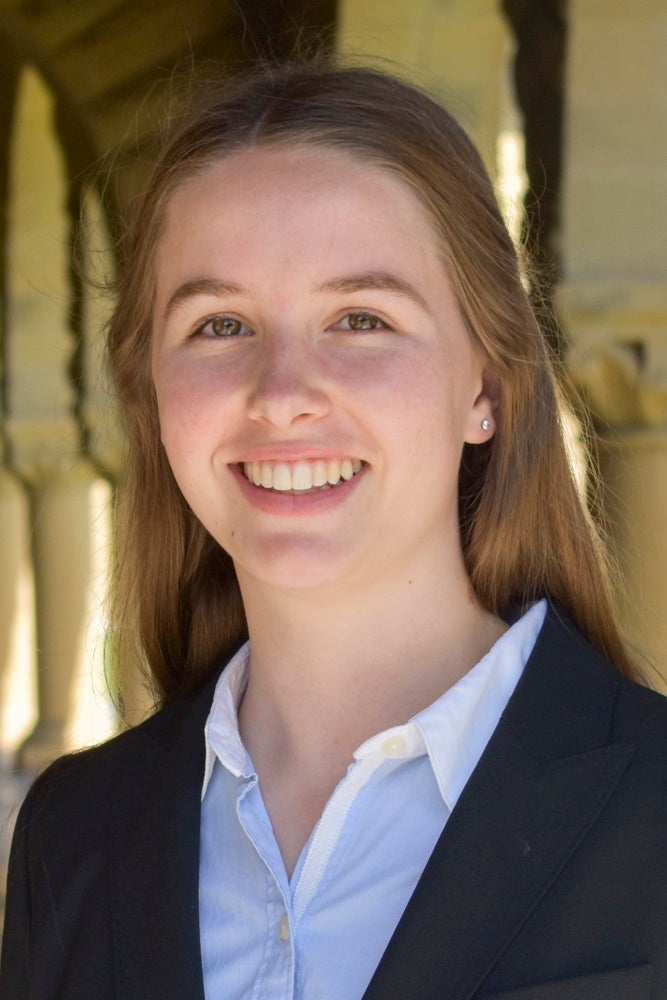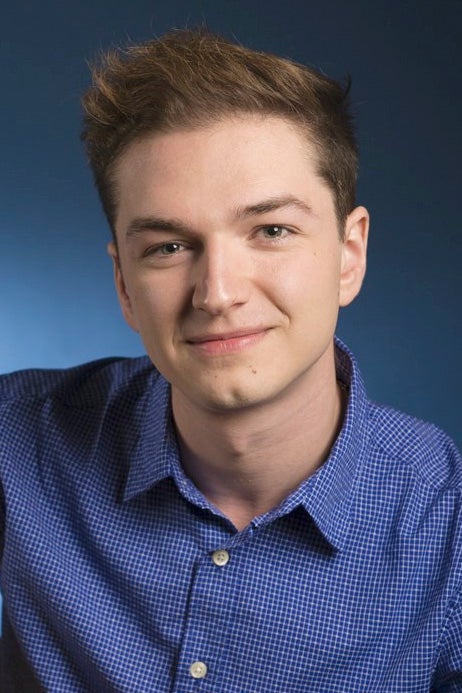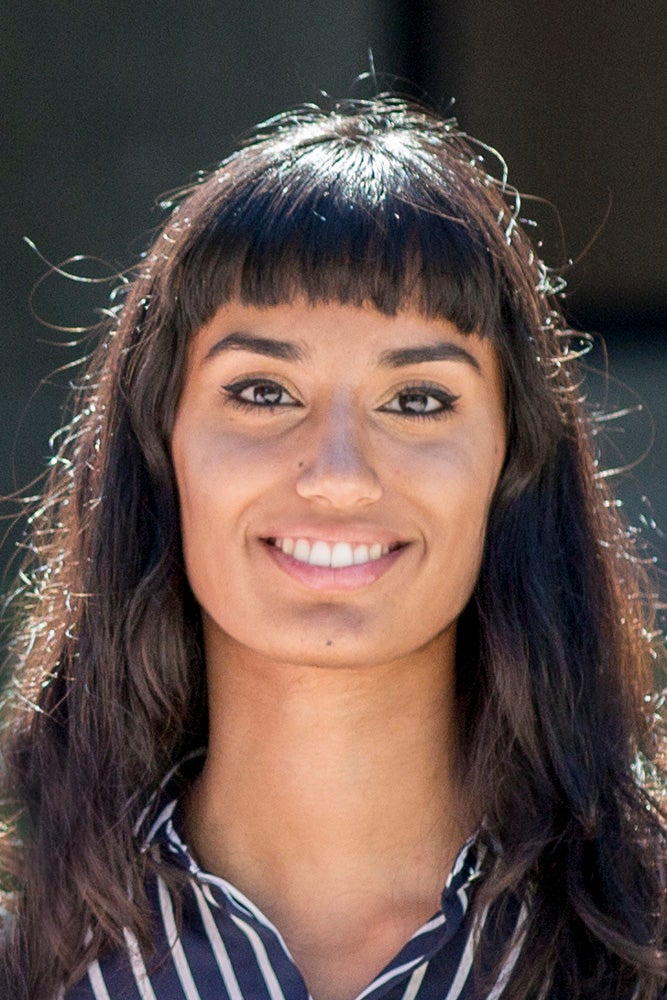Two Stanford seniors and a Stanford Medicine researcher win 2018 Gates Cambridge Scholarships
The three winners with Stanford affiliations are among the 35 Americans awarded scholarships to pursue graduate studies at the University of Cambridge in England.
Stanford seniors Lauren Killingsworth and Steve Rathje have won 2018 Gates Cambridge Scholarships to pursue graduate studies at the University of Cambridge in England.
In addition, Monica Kullar, a clinical neuroscience research coordinator in a Stanford Medicine laboratory focused on precision mental health and translational neuroscience, has been awarded a 2018 Gates Cambridge Scholarship.
They are among the 35 Americans who were recently awarded scholarships by the Gates Cambridge Trust.
The Bill and Melinda Gates Foundation established the Gates Cambridge Scholarships in 2000 to enable outstanding graduate students from outside the United Kingdom to pursue full-time graduate studies in any subject at the University of Cambridge. The program aims to build a global network of future leaders committed to improving the lives of others.

Lauren Killingsworth (Image credit: Richard Kuszmaul)
Lauren Killingsworth, 22, of Mill Valley, California, who is majoring in biology, is writing an honors thesis in structural biology in the lab of William Weis, a professor of structural biology in School of Medicine. She is minoring in history, with a concentration in historical geography and the history of medicine.
Killingsworth, whose history research at Stanford has focused on maps of cholera outbreaks made by physicians in 19th-century Britain, plans to pursue a master’s degree in history and philosophy of science and medicine at Cambridge.
“I hope to better understand the role of maps in shaping perceptions of disease, illuminating health disparities and initiating public health reform,” she wrote in her Gates Cambridge Scholarship application.
Killingsworth said her work in the history of medical cartography is driven by her experiences in public health. She conducted research on pediatric eye disease at the National Institutes of Health during the summer of 2015. She conducted research on proteins implicated in Alzheimer’s disease as an Amgen Scholar at Harvard Medical School during the summer of 2016.
Killingsworth is second author on the paper “Structural Basis for Regulated Proteolysis by the α-Secretase ADAM10,” which was published in December 2017 in Cell.
She is a co-editor of Stanford Journal of Public Health, a biannual student-run publication.
Currently, Killingsworth is helping to develop a health-coaching program at a local clinic under a Community Health Advocacy Fellowship awarded by Stanford Medicine.
“My work in the lab and in the community raised questions that were as much social as scientific,” Killingsworth said. “How does research influence public health initiatives, and who receives the benefits? How is research communicated to the public? These questions drew me to the history of science and medicine.”
Last year, Killingsworth won two prizes for her paper “Mapping Public Health in 19th-Century Oxford,” including an international undergraduate prize and the Dr. Walter W. Ristow Award for Academic Achievement in the History of Cartography, an award that included publication of the paper in The Portolan Journal. The article will appear in the journal’s March issue. She wrote the paper while studying at the University of Oxford as part of the Bing Overseas Studies Program.
Killingsworth was recently awarded a 2018 Deans’ Award for Academic Achievement, which is awarded annually to up to 10 Stanford undergraduates for exceptional accomplishments in independent research.

Steven Rathje (Image credit: Mark Madeo)
Steven Rathje, 22, of Lake Oswego, Oregon, is majoring in psychology, with honors, and minoring in symbolic systems.
For his honors thesis, Rathje is working with Alia Crum, assistant professor of psychology, and Carol Dweck, professor of psychology, to conduct a series of psychological studies examining how metaphorical language influences our mindsets and beliefs.
Rathje plans to pursue a doctorate in psychology at the University of Cambridge.
“I am fascinated by the role that metaphors play in our thoughts and by the impact that framing has on our reasoning,” Rathje wrote in his scholarship application.
“These are subjects I have explored throughout my three years of psychology research at Stanford and through my work as a writer. I recently wrote an article for The Guardian newspaper, “The power of framing: It’s not what you say, it’s how you say it,” which examines the role of framing in making political arguments and discusses how we can use the knowledge of framing to have a better dialogue. At Cambridge, I plan to continue this line of research, exploring how the way we frame issues influences our reasoning.”
After studying at Cambridge, Rathje said he plans to become a psychology professor and a public communicator of psychology who uses his work in writing and art to make knowledge of psychology more accessible to the general public.
At Stanford, Rathje is a research assistant for the Mind & Body Lab and a teaching fellow for the Psychology One program. Rathje was elected to Phi Beta Kappa as a junior, and was recently awarded the J.E. Wallace Sterling Award for Academic Achievement, which recognizes the top 25 graduating seniors in the School of Humanities in Sciences.
Rathje is the author of Signs, a surrealistic comedy “about love, purpose and the little things that seem to matter too much to us,” which was produced by Stanford Theater Lab in 2016. The play also won the Artists Repertory Theatre’s 2016 Oregon New Play Prize, which comes with a $10,000 commission and production at the theater. Rathje also won first place in Stanford’s 2017 Bocock/Guerard Fiction Prize competition for his short story “The Placebo Addict,” which is about a woman who uses placebos as a way to continually transform her identity and to try on personalities like clothing until she finds one that fits.
Rathje is also the founder and producer of Proscenium Live, a free festival of new plays held annually in Portland, Oregon. The festival is aimed at promoting arts accessibility and providing development opportunities for playwrights. Rathje won an Ozy Genius Award, a Strauss Public Service Scholarship and a summer project grant from the Haas Center for Public Service to support Proscenium Live.

Monica Kullar (Image credit: Dickson Chow)
Monica Kullar, 23, of San Jose, California, is currently working as a clinical neuroscience research coordinator in the Williams PanLab, which is focused on precision mental health and translational neuroscience.
At Cambridge, Kullar will pursue a doctorate in biological science in the university’s MRC Cognition and Brain Science Unit, which uses cognitive theory and innovations in neuroscience to understand and improve mental well-being across lifespans.
“I aim to conduct research on the effectiveness of down-regulating negative emotions in stressful, real-world contexts, and elucidate further on neurobiological models of emotion regulations across both health and vulnerable populations,” she said.
“My goal is to advance our understanding on the complexities of managing our emotions and address ways to improve emotional and mental health. Ultimately, my ambition is to pursue an academic career within the growing field of social and affective neuroscience by leading my own laboratory and continuing to drive translational and applied research.”
Kullar, who joined the PanLab in July 2016, is part of the RAD (Research on Anxiety and Depression) Project, which is aimed at developing a new understanding of anxiety and depression, and the RAINBOW-ENGAGE project, which is focused on understanding the neural basis of obesity and depression.
She is a co-author of “The ENGAGE study: Integrating neuroimaging, virtual reality and smartphone sensing to understand self-regulation for depression and obesity in a precision medicine model,” published in October 2017 in Behavior Research and Therapy.
Kullar joined the Stanford community in July 2015 as a research assistant in the Stanford Social Neuroscience Laboratory, after graduating a year early from the University of California, San Diego, with a bachelor’s degree in psychology.
As a volunteer, Kullar independently leads mentoring and tutoring services to disadvantaged students from lower-income families in the Bay Area.
“Encouraging diversity in science and higher education is really important to me and I believe that reaching out to at-risk youth is one way to address this gap,” she said.
“I’ve found it very rewarding to help students positively change their mindset over difficult classes. Providing support to students who have fewer resources makes all the difference. I hope that with every young student who feels more confident about tackling schoolwork after tutoring, we may be able to see greater diversity in academia and in our future leaders.”
International scholarships
Stanford students interested in overseas scholarships and Stanford faculty interested in nominating students for such awards should contact Diane Murk, manager of the Overseas Resource Center at dmurk@stanford.edu, or John Pearson, director emeritus of the Bechtel International Center, at john.pearson@stanford.edu.
